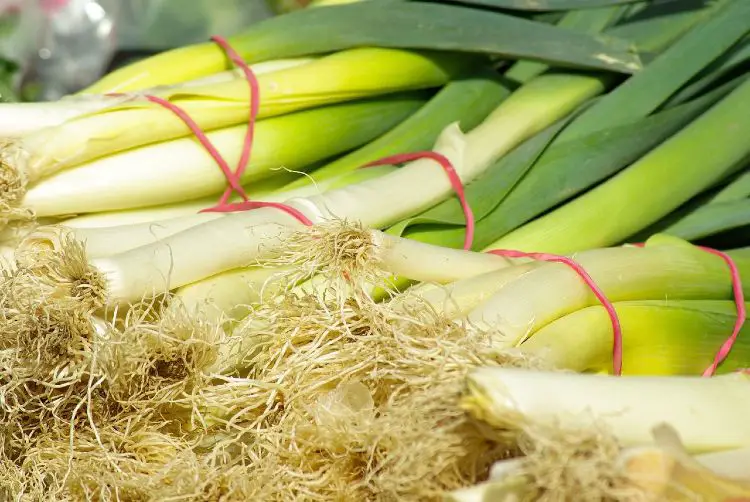Does Freezing Garlic Destroy Nutrients?
Yes. Freezing garlic destroys its nutrients, but only if you freeze it in a particular manner. We have already seen that you can freeze garlic in many ways. You can freeze it whole, unpeeled, peeled, separated into cloves, chopped, sliced, crushed, and pureed. Freezing garlic loses its nutrients only if you chop, slice, cut, or crush the bulb. Freezing does not destroy the nutrients if you freeze the whole garlic or its cloves without chopping them. So, let us see these nutrients and why they get destroyed during freezing.
What Are The Nutrients Present In Garlic?
Garlic is renowned for its medicinal properties. It contains a critical natural substance, allicin, that helps reduce blood pressure and inflammation. In addition, allicin helps in improving blood circulation by discouraging clot formation. Freezing garlic can destroy this nutrient and render the garlic ineffective.
What is Allicin?
Have you noticed that garlic gives a unique, pungent odor when cut or chopped? It is because garlic releases a sensitive enzyme, alliinase, responsible for producing allicin. However, crushing the garlic destroys the enzyme and thus deters the formation of allicin. But, you can crush the garlic and allow it to stand for ten minutes before cooking. It allows sufficient time for the enzyme to be released and allicin to form. Once the allicin is created, it remains heat stable. Therefore, we do not recommend heating the garlic immediately after crushing it.
Does Freezing Garlic Destroy Allicin?
Yes. Freezing garlic destroys allicin. So, if you have a lot of garlic and prepare garlic puree by crushing and blending it, you destroy the crucial ingredient allicin. Thus, it affects the natural healing and medicinal qualities of garlic.
Is There Any Way Of Freezing Garlic Without Destroying Allicin?
You can always freeze the garlic whole or remove its cloves without crushing them. As you have not crushed the garlic, it does not destroy the enzyme alliinase. Hence, allicin does not form. Therefore, there is no question of destroying it.
Is There Any Alternate Way To Preserve The Allicin Content In Garlic?
Another way of preserving the allicin in the garlic is dehydrating it instead of freezing garlic. Dehydrating the garlic is easy. First, you cut the garlic cloves and place them on a mesh screen to dehydrate them for ten to twelve hours. Alternatively, you can dehydrate the garlic in an oven at the lowest setting.
You can store the dehydrated garlic in a cool and dark place. It remains fresh for an extended period. You can use dehydrated garlic to make garlic salt. You can have it in soups, bread, sandwiches, and sauces.
Why Is Allicin So Important?
Allicin is responsible for giving a pungent odor to the garlic. However, the most significant benefit of allicin is the high concentration of anti-oxidants in each molecule. These anti-oxidants cause chemical reactions to neutralize unstable molecules and prevent cell damage.
Allicin improves blood circulation and thins the bloodstream. Hence, it is helpful as an anti-clotting agent. Thus, it reduces cardiovascular diseases and eliminates pain when it enters an inflamed body area. Besides, allicin has anti-bacterial properties and helps fight off Staphylococcus Aureus, generally found in wounds.
What Is The Nutrition Level Of Raw Garlic?
One serving of raw garlic (three cloves) offers 13 calories. It has Vitamin B6, niacin, pantothenic acid, riboflavin, and thiamine. It also contains Vitamin C, Vitamin K for blood coagulation, manganese, copper, zinc, phosphorus, potassium, and iron.
What Is The Nutrition Level Of Cooked Garlic?
Cooking diminishes the vitamin content in garlic considerably. Vitamins B and C are water-soluble. So, boiling reduces vitamins in garlic. Therefore, we recommend steaming and reducing cooking times to preserve vitamin C. Vitamin K is fat soluble. Thus, cooking does not affect it. Though the minerals are not broken down, boiling the garlic leaches out calcium, magnesium, and other minerals.
Does Cooking Garlic Before Freezing Affect All These Nutrients?
Frying the garlic damages some of its chemical properties. For example, it causes the water and fat to evaporate. Besides, the heat generated during frying accelerated the chemical reactions. Therefore, cooked garlic loses its nutrients before it is subject to freezing. So, we recommend freezing raw garlic to retain its nutrients better. Besides, crushing the garlic destroys allicin, the most significant nutrient found in garlic.
Is Frozen Garlic Good For Your Health?
A lot depends on how you freeze the garlic. If you freeze the garlic chopped and crushed, it loses its primary nutrient, allicin. Likewise, it loses various vitamins and minerals if you cook and fry the garlic before freezing. So, the best way to freeze garlic is to freeze it whole or freeze the cloves, peeled or unpeeled. Garlic frozen this way retains all its nutrients and is thus healthy.
Is Frozen Garlic As Good As Fresh?
Frozen garlic has fewer nutrients than fresh garlic. So, it is always better to store garlic at room temperature rather than freeze it and lose its nutrients. Garlic has a long shelf life and retains its nutrients for a long time. However, if you wish to freeze garlic, we recommend freezing it whole without cutting or chopping the cloves. You can peel and remove the individual cloves before freezing. But, we never advise crushing them because it results in losing its primary constituent, allicin.
Does Freezing Garlic Ruin It?
The frozen garlic retains its flavor but loses its crunchy texture. The taste does not change unless you chop it and freeze it.
Does Freezing In Oil Help Retain The Nutrients?
Freezing the garlic cloves submerged in olive oil is an excellent way of freezing garlic. It helps some of its crunchiness after freezing.
Can You Get Botulism From Garlic?
Mixing garlic paste with oil at room temperature facilitates the growth of the toxic bacteria, Clostridium Botulinum, that produces botulism-causing toxins. Therefore, the remedy is to refrigerate or freeze the garlic immediately. Lowering the temperature to 40 degrees Fahrenheit or less helps you to preserve the garlic for seven days in the refrigerator. You can freeze the paste if you wish to store it for extended periods.
Final Thoughts
Garlic is renowned for its medicinal properties. While it has a sufficiently long shelf life, freezing garlic is possible. However, crushing or chopping the garlic before freezing can result in nutrient loss. It is because the garlic loses its most significant constituent, allicin. But, freezing it whole does not cause any loss in its nutrition level.



